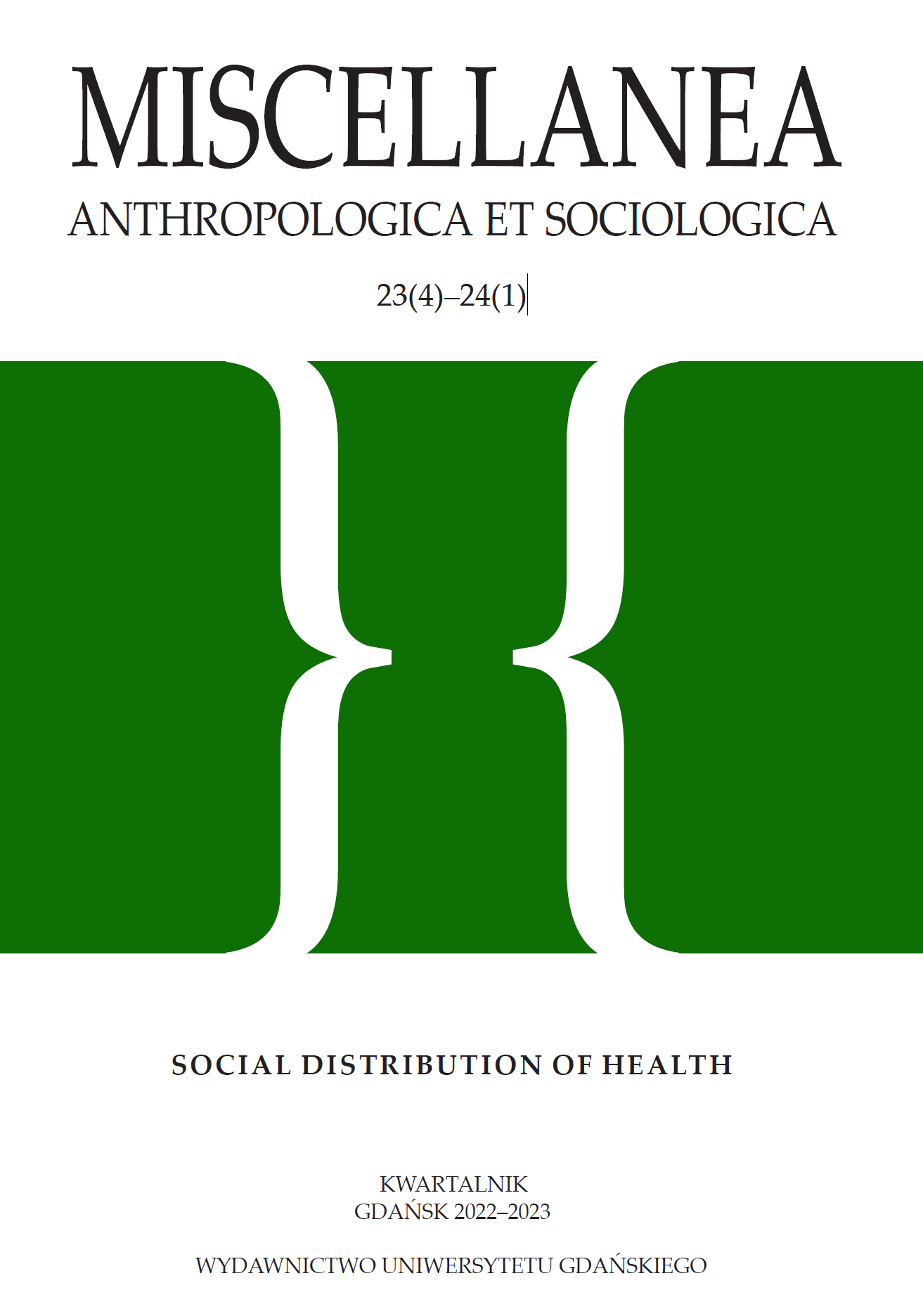The Idea of Occupational Justice and Difficulties with Its Implementation in Polish Conditions on the Example of People with Mental Disorders
Słowa kluczowe:
occupation, occupational justice, occupational injustice, mental healthAbstrakt
Occupation is one of the basic human needs. The term refers to all activities that people need to, want to, and are expected to do. It includes activities of daily life related to selfcare, productivity and leisure time, named, defined and having a value given to them by individuals and culture. Human beings are occupational beings, and occupation is an active element of human existence, necessary for health as it is understood in the broadest sense.
The right to pursue activities relevant to the individual, which is enshrined in the concept of occupational justice, is often not reflected by the opportunities available to individuals or groups facing various types of limitations, e.g., disabilities, mental disorders, social exclusion, etc. Limited awareness, unavailability of support, funding difficulties – this is the grim reality both for people struggling with certain difficulties and for those who look after their care.
In this article, the idea of occupational justice is contextualised within the Polish reality of health care and social care directed to people with mental disorders.
Downloads
Bibliografia
Algeo N., Aitken L.M., 2019, The Evolving Role of Occupational Therapists in Adult Critical Care in England: A Mixed Methods Design Using Role Theory, “Irish Journal of Occupational Therapy”, vol. 47, no. 2, DOI: 10.1108/IJOT-04-2019-0005.
Batson C.D., Polycarpou M.P., 1997, Empathy and Attitudes. Can Feeling for a Member of a Stigmatized Group Improve Feelings Toward the Group, “Journal of Personality and Social Psychology”, vol. 71, no. 1.
Castro D., Dahlin-Ivanoff S., Mårtensson L., 2016, Feeling Like a Stranger: Negotiations with Culture as Experienced by Chilean Occupational Therapists, “Scandinavian Journal of Occupational Therapy”, vol. 23, no. 6.
Finlay K.A., Stephan W.G., 2000, Reducing Prejudice: The Effect of Empathy on Intergroup Attitudes, “Journal of Applied Social Psychology”, vol. 30, no. 8.
Goffman E., 2007, Piętno. Rozważania o zranionej tożsamości, Gdańsk: Gdańskie Wydawnictwo Psychologiczne.
Hammond A., 2004, What is the Role of the Occupational Therapist?, “Best Practice Research Clinical Rheumatology”, vol. 18, no. 4, DOI: 10.1016/j.berh.2004.04.001.
Jia R., Ayling K., Chalder T., Massey A., Broadbent E., Coupland C., Vedhara K., 2020, Mental Health in the UK During the COVID-19 Pandemic: Early Observations, “British Medical Journal Open”, vol. 10, no. 9, DOI: 10.1101/2020.05.14.20102012.
Juczyński Z., 2016, Zmaganie się z nieuleczalną chorobą – mobilizacja osobistych potencjałów zdrowia, “Sztuka Leczenia”, no. 1.
Kaszyński H., 2013, Praca socjalna z osobami chorującymi psychicznie. Studium socjologiczne, Kraków: Wydawnictwo Uniwersytetu Jagiellońskiego.
Kiejna A., Adamowski T., Piotrowski P., Moskalewicz J., Wojtyniak B., Świątkiewicz G., … Kessler R.C., 2015, Epidemiologia zaburzeń psychiatrycznych i dostępność psychiatrycznej opieki zdrowotnej. EZOP – Polska – metodologia badania, “Psychiatria Polska”, vol. 49, no. 1, DOI: 10.12740/PP/30810.
Law M., Cooper B.A., Strong S., Stewart D., Rigby P., Letts L., 1996, The Person-environment-Occupation Model: A Transactive Approach to Occupational Performance, “Canadian Journal of Occupational Therapy”, vol. 63.
Law M., Polatajko H., Baptiste W., Townsend E., 1997, Core Concepts of Occupational Therapy [in:] E. Townsend (ed.), Enabling Occupation: An Occupational Therapy Perspective, Ottawa: Canadian Association of Occupational Therapists.
Lejzerowicz M., Książkiewicz I., 2012, Osoba z niepełnosprawnością a instytucje pomocowe, Wrocław: Wydawnictwo Gaskor.
Mazza C., Ricci E., Biondi S., Colasanti M., Ferracuti S., Napoli C., Roma P., 2020, A Nationwide Survey of Psychological Distress among Italian People during the COVID-19 Pandemic: Immediate Psychological Responses and Associated Factors, “International Journal of Environmental Research And Public Health”, vol. 17, no. 9, DOI: 10.3390/ ijerph17093165.
Misiorek A., 2019, Współczesne pojęcia, definicje i koncepcje w terapii zajęciowej [in:] A. Misiorek, E. Janus, M. Kuśnierz, R. Bugaj (eds.), Współczesna terapia zajęciowa, Warszawa: PZWL.
Moskalewicz J., Wciórka J. (ed.), 2021, Kondycja psychiczna mieszkańców polski. Raport z badań. Kompleksowe badanie stanu zdrowia psychicznego społeczeństwa i jego uwarunkowań, Warszawa: Instytut Psychiatrii i Neurologii.
Niemczyk-Zając A., 2021, Sytuacja osób zaburzeniami psychicznymi, “Zeszyty Naukowe WSG, seria: Edukacja – Rodzina – Społeczeństwo”, vol. 39, no. 6.
Najwyższa Izba Kontroli 2021, NIK o organizacji pracy nauczycieli w szkołach publicznych – część I, www.nik.gov.pl (accessed on 24.05.2023).
Psychiatraonline.pl, Ilu jest psychiatrów w Polsce, 21.05.2022, https://www.psychiatraonline.pl/kwartalnik/ilu-jest-psychiatrow-w-polsce/ (accessed on 31.12.2022).
Reilly M., 1963, Occupational Therapy Can Be One of the Great Ideas of 20th Century Medicine, “The American Journal of Occupational Therapy”, no. 16.
Rocamora-Montenegro M., Compañ-Gabucio L., Garcia de la Hera M., 2021, Occupational Therapy Interventions for Adults with Severe Mental Illness: A Scoping Review, “BMJ Open”, DOI: 10.1136/bmjopen-2020-047467.
Townsend E.A., 2012, Boundaries and Bridges to Adult Mental Health: Critical Occupational and Capabilities Perspectives of Justice, “Journal of Occupational Science”, no. 19.
Wilburn G.V., Hoss A., Pudeler M., Beukema E., Rothenbuhler C., Stoll H.B., 2021, Receiving Recognition: A Case for Occupational Therapy Practitioners as Mental and Behavioral Health Providers, “American Occupational Therapy Association”,vol. 75, no. 5, DOI: 10.5014/ajot.2021.044727.
WFOT, 2012, Definition of Occupational Therapy, https://www.wfot.org/resources/definitions-of-occupational-therapy-from-member-organisations (accessed on: 30.12.2022).
Legislation
Dz. U. Nr 111, poz. 535 z późn. zm. – Ustawa z dnia 19 sierpnia 1994 r. o ochronie zdrowia psychicznego, art. 3.

 Uniwersyteckie Czasopisma Naukowe
Uniwersyteckie Czasopisma Naukowe




